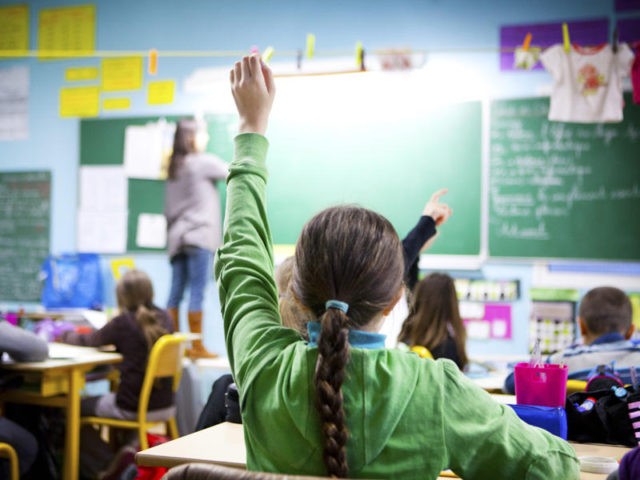A historian has slammed the double standards employed in French schools which present Muslim conquerors as peaceful and brilliant, and Christians as backwards oppressors.
Against the backdrop of terror attacks and rising Islamic extremism worldwide, teacher and author Barbara Lefebvre contends that education on Islam has “never been more necessary”. But the historian, who has published several books on the Holocaust, argues that textbooks’ sanitisation of Muslim conquests and their presentation of an Islamic supremacist version of history is completely unhelpful.
The historian says textbooks focus on the “peaceful coexistence” of Muslims and Christians and that official guidelines tell teachers not to study “events that tend to emphasise the warlike contacts”.
She draws attention to the fact that, incredibly, books use the term “resuming control” when describing Mohammed’s conquests of previously non-Muslim areas. This presents as legitimate “reconquests” the warlord’s bloody takeovers of regions that were never previously Muslim, nor his territory.
This directive is ignored, she notes, when it comes to the Crusades, as prominent textbooks title their chapter on the subject of Christian self-defence “Violent Holy Wars”. This period of history, and the Spanish people’s reconquest of their own country, is told through a series of bloodthirsty “crimes”, Lefebvre notes.
The focal point of peaceful cooperation between the two religions is exemplified by trading relations in the French curriculum. However, Lefebvre observes that even this narrative follows a Muslim supremacist agenda as textbooks “unanimously describe Islamic civilisation as ‘brilliant’” and claim that all the West is hugely in debt to Arabic science.
To hammer home the discredited idea that Muslims were wise educators to Europe’s ignorant cave-dwellers, the professor discloses that textbooks quote a Muslim occupier as saying: “This country does not know what science is and those who lived knew no one here who had made himself illustrious by his love for knowledge.”
Lefebvre notes that, to emphasise this one-sided narrative, students are asked to “show that the presence of Muslims in Andalusia helps develop science and Greek philosophy in the West” in their assessment.
The professor describes as “disconcerting” the fact that textbooks rely entirely on Muslim sources for accounts of relations between Muslims and non-Muslims.
As a result, pupils in French classrooms are taught that non-Muslims welcomed being conquered and invaded as “a blessing”. Several textbooks, Lefebvre notes, claim “[Non-Muslims] opened the gates of their city with the singers and the musicians began to play and paid the poll tax”.
“In textbooks, it appears that in Saudi after 632 everyone became Muslim like magic without pressure”, she writes, asserting that so many under Muslim rule had only a “choice between conversion and death”.
By focusing on an idealised image of “peaceful coexistence” under Muslim rule, Lefebvre blasts the narrative French schools project by completely neglecting to clarify the conditions under which non-Muslims were forced to live.
She notes that “like other ancient or medieval conquests” the Islamisation of non-Muslim areas “meant dispossessing the indigenous of their sovereignty”. For reference, the historian points to how when Christians in Toledo tried to resist this process they were mutilated and crucified by the invading forces.
Further, she argues that to summarise the life of non-Muslims living under Islamic rule as being protected in return for a tax is completely dishonest.
“If textbooks were willing to describe the humiliating terms of [non-Muslims living under Islamic rule]” Lefebvre contends that it would be clear to students that Christians were “stigmatised” and made third class citizens in every respect under Muslim rule.
Lefebvre notes that while textbooks devote whole pages to crimes committed by Europeans, Arab crimes are completely omitted. A clear example of this, she points out, is that textbooks neglect to mention Muslims’ 13 centuries-long enslavement of Africans.
Contrasting Islamic slavery with the European slave trade, Lefebvre highlights the fact that Arabs would castrate male captives and that the majority died as a result, which is why African slaves left little genetic trace in Muslim countries.
The professor argues that it’s wrong that the issue of Islamic slavery is completely absent from classrooms when children learn that the suffering of Africans throughout the centuries “comes down to the Transatlantic Slave Trade”.
Furthermore, she brings up the fact that it’s impossible to find any history of Arab Muslims opposing slavery, “unlike Europeans who fought for the abolition of this inhuman trade against their slave contemporaries”.
Lefebvre contends that the reason the government insists on the “glorification” of Islamic history in French classrooms is because multiculturalism “has reached an identity point of tension close to breaking”.
The professor argues that textbooks’ sanitising of Islam is counterproductive in that the issue of jihad is never addressed when from the religion’s dawn it has served to justify “imperialist conquest made of looting, killing and settlement”.
By employing such obvious double standards, Lefebvre says the history curriculum is failing in its duty to enlighten students, “to make them informed citizens and to develop in them the critical spirit to analyse historical sources and not just learn [an agenda]”.

COMMENTS
Please let us know if you're having issues with commenting.